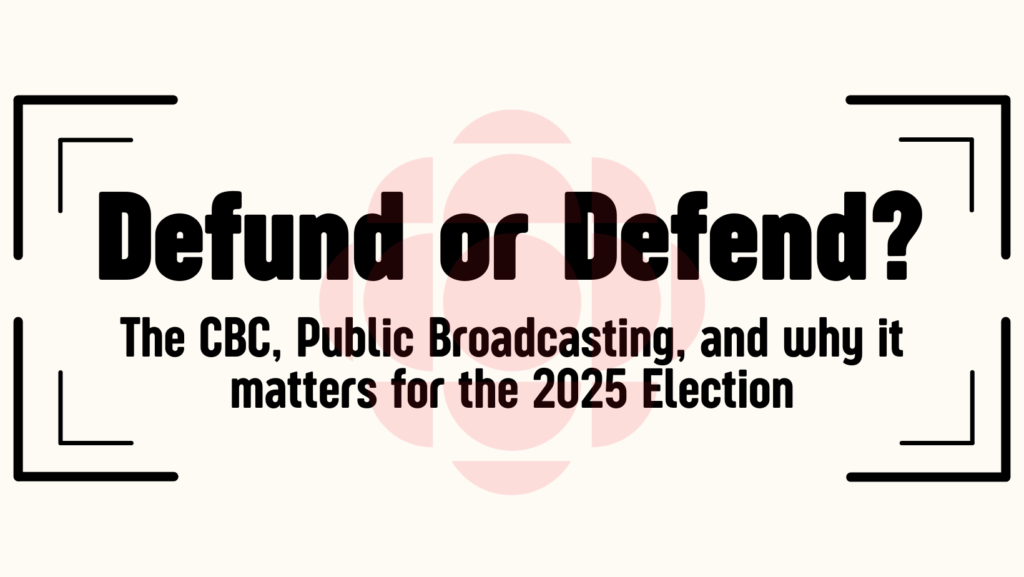As Canada ramps up to another election, there is one campaign promise that I feel the need to examine: the call to defund the Canadian Broadcasting Corporation (CBC). This essay seeks to clarify the role of Public Broadcasting and how it overlaps with the concept of State Media, while considering the CBC as a case study. Additionally, I’ll address Pierre Poilievre’s arguments for defunding the CBC and why it matters for the coming election.
Part 1: State Media & Public Broadcasting
The fear of government overstep is baked into so much pop culture. The origins of this lie mostly in the fear of communism that has seeped into much of American media from the time of McCarthyism. If the government owns or controls too many things, that means the people do not. George Orwell could not have imagined how 1984 would spiral so beyond his intentions decades later. People feel a sort of hypervigilance when it comes to the government, that there are no good intentions in governing; therefore, anything the government touches is tainted. And a new target has entered the vision: Public Broadcasting.
Public Broadcasting is an independent form of media organization (radio, TV, etc.) with the goal of public service and serving the populace. It is often a crucial part of nation-building, supporting national identity and local stories to cultivate a uniquely (insert nationality here) audience. Public Broadcasting serves to support content that is not necessarily profitable, would it appear on mass market television/radio. This is one of the reasons why these channels are often educational in nature, with documentaries, investigations, public interest stories, and childrens content.
State Media takes the goal of nation-building to its extreme. While one can argue that there is a spectrum spanning from Public Broadcasting to State Media (for example see Media and Journalism Research Center’s “State Media Matrix”) it is also important to understand the distinction between the two in their extremes. State Media is controlled and financed by governments, so in its most extreme form, news content is written, produced, and financed by the government. The CBC features only one of these three facets (finance) but maintains independence as a separate organization in control of the narratives it shares. State Media seeks to promote state sanctioned political thought and opinion, and is intimately connected to the concept of propaganda. But while propaganda can and does exist in every media landscape, State Media tends to exist in its most pure form in autocratic and non-democratic countries which usually also promote state ownership in the economy.
Public Broadcasting in its purest form receives no funding from the state government, think NPR in the United States. But, while still receiving funding from the government, the CBC is a Public Broadcaster. The CBC is independent from editorial or governing control from the state. However, if you’re going to make an argument to incite fear, it is not hard then to use the language of State Media to describe the CBC. By calling it state-run, detractors and critics are hoping that you will picture a dystopian world where the CBC is playing from public speakers and on your TV at all hours. There is still plenty of space to critique the CBC however, I oppose the disingenuous narrative that seeks to pose the CBC as the propaganda wing of the federal government akin to an autocratic state.
Public Broadcasting is not inherently free from bias, I need to make that clear. And especially if it receives funding, it is not free from the control of its state government. Any organization that receives any amount of money from the government is in some way beholden to it. The influence and strength of the government over these various funded organizations is likely to vary. But at the end of the day, if an organization receives money from the government, it is likely not to take a strongly antagonistic role against said government.
Part 2: Why do we have the CBC?
The origins of the CBC lie in a concern of encroaching American influence. A tale old as time. An earlier form of the organization was created in 1932, with French language services beginning in 1937 and television broadcasting beginning in 1952. Since moving abroad, I’ve really come to terms with how much of Canadian identity is built around rejecting and accepting certain pieces of American, British, and French culture and a promotion of a unique multiculturalism. Defining “Canadian identity” has always been framed as an exercise of “what are we not”, and the reason is tied to the global superpower we have on our doorstep.
Institutions like the CBC and Canadian content laws for the CRTC have promoted Canadian art and Canadian stories where American content has always been accessible. Growing up some of my most watched television channels were coming from Washington State (makes sense being from BC) and weirdly enough Georgia. Our screens lit up American campaigns, businesses that didn’t exist in our country, and ‘local’ news that had nothing to say about where we lived. With this sort of environment, it can cause an unwilling alignment and/or great disdain for our neighbour. I say and/or because that feels true for me. I’ve witnessed a lot of American culture intimately while also feeling that a piece of my own culture was hidden or less-than.
I’m writing this article after a paralyzing few months of watching Donald Trump effectively ruin the relationship between our countries. And one of the craziest things about this, has been the swelling patriotism of the Canadian public. Canada has always had a unique relationship to nationalism, as I mentioned above, the defining of ourselves as not-American, not-British, and not-French has given us some identity problems. I would also say that in the past few years and especially since the release of the Truth and Reconciliation Commission’s 94 Calls to Action, many have come to question a pride in a country that was founded on genocide. So I embrace the new patriotism cautiously, hoping we don’t abandon a nuanced understanding of our country’s origin in exchange for an anti-American rallying cry.
While the conversation around defunding the CBC has focused on the news coverage, it’s also important to see the CBC as more than simply a news organization, it is a media organization which also provides educational content and entertainment content. This content is the functioning part of the cultural industry. You are more likely to point to Schitt’s Creek, Corner Gas, and SCTV as pillars of Canadian identity than anything else. And while the latter two are properties of other institutions, the point is to highlight the importance of Canadian content. CBC has still produced some great IP, including Little Mosque on the Prairie, Heartland, Degrassi, the reality show Dragon’s Den, and a slew of children’s programming.
Do we necessarily need the CBC to create Canadian content? Of course not, but it provides an institutional backbone to support creatives who want to create relevant and interesting Canadian content. To lose the CBC means that those creatives will turn to the few other operating organizations. To pitch uniquely Canadian shows and movies to American (or other global) companies will draw a critical eye to the financial return, which given the size of the Canadian market, will likely remain unappealing. Only Canadians can further Canadian creativity, storytelling, and identity.
Part 3: What’s the alternative?
Public Broadcasting is not the sole means of providing public service in the form of news and information sharing. People have managed to spread news around long before formal channels existed, it’s just that formal channels are much easier to maneuver and reach the masses.
In today’s current arena, the most accessed news sources are those of what is referred to as ‘legacy’ media. These are news institutions that were widely successful before the internet boom. This also includes movie and music institutions, and often these organizations reach into many forms of, well, media. Think of Warner Media, Disney, and Viacom. These institutions are not created for the public good or public service, but rather capital. While we may view their existence as a net-positive for entertainment and storytelling, their purpose is to generate money and maximize profit.
If you’re looking for Canadian news, produced in Canada by Canadians, and not supporting the CBC then you’re going to have to look towards some of the most reviled corporations on our soil: Bell, Corpus (Shaw), Rogers, and Quebecor.
After we take away these two main sources for news content, that is Public Broadcasting and Legacy Media, we’re left with a handful of actors: small media companies and independent journalists. When I think of the main players in this last category I think primarily of organizations like Breitbart News and the Canadian version Rebel Media. These are highly ideologically driven media organizations that do not shy away from acknowledging their often radical and extreme biases. Of course there also exists freelance and independent journalists, perhaps working for independent publications or shopping stories out to relevant legacy media institutions.
The main criticism that has been levied against any form of State Media including Public Broadcasting is that the reporting is biased in favour of the state. This is a concern that is valid for any form of State ownership or involvement with media. In the previous section, I acknowledge that organizations such as the CBC that take any money from the government are likely not going to take a very antagonistic position against the government.
However, and I have to genuinely ask, are legacy media or independent companies really beholden to no one? From my perspective we have just jumped from one Goliath to another. Because all institutions have bias. All people have bias. But whether that bias is pointing towards a government or whether it is pointing towards an economic system that benefits its existence, media bias is unavoidable.
I can’t defend absolutely the CBC or other partially state-funded or state-owned media institutions. But I think it’s wise to consider that when you critique that model of news dissemination, you are effectively turning a blind eye to the media bias that comes from your preferred sources. I am not actively encouraging everyone to support the CBC (or your relevant organization), however I encourage you to think critically about any source of news, not just the ones that are tied to the government. Is supporting giant media conglomerates that much better? Is supporting heavily ideologically biased institutions much better?
Part 4: Defund or Defend the CBC?
I am immediately critical of the “state-bias” argument when it comes to defunding the CBC, because to me, there is no way to provide unbiased news coverage, because it is not possible for a person or an agency to be unbiased. Everyone answers to an agenda, whether they admit to it or not. The words we choose, how we interpret the world around us, and how we represent our interpretations are steeped in our own worldview and politics. And there’s nothing wrong with this. But I do agree that there needs to be transparency and the CBC could benefit from diversifying its journalistic pools.
But I won’t beat around the bush, Pierre Poilievre’s call to defund the CBC is nothing but a cheap campaign stunt to distract from his lack of proper strategic vision for this country. And seeing how his campaign has faltered in light of the tariff war with the US, it’s clear that the messaging to defund one of Canada’s oldest institutions aged poorly. As I mentioned, I can partly get on board with an argument to diversify the political scope of journalists employed by the CBC but that’s as far as I’ll go. Because to call the CBC the “propaganda arm of the Liberal Party” is a harkening back to red scare tactics. The CBC has existed through successive conservative and liberal governments. To position it as somehow a unique institution to the Liberal Party is irresponsible and denies the rich history of public broadcasting in Canada (which was started by a Conservative government). Poilievre is exploiting a fear that our liberals have become too powerful, meanwhile the Liberal Party has been in highly publicized shambles for quite some time. By making the Liberals look like Goliath, he incentivizes his followers to believe they are undertaking a holy and justified war against a fairly harmless institution. And if there’s one compliment I don’t mind dolling out to Poilievre, it’s his flair for the dramatics and strategic use of language.
But to turn to Poilievre’s other argument, that the government should only fill gaps that are not supported by the private sector, I have to ask which private sector he is referring to. The private sector in Canada without the CBC will be crushed absolutely by overwhelming American sources filling the void. He claims to support the French services since there is not enough of a market for the private industry, but then this misunderstands the purpose of Public Broadcasting: to support the public and create national identity. Again, national identity cannot be built by anyone who is not Canadian. Does he have a plan to protect and promote private Canadian industry? Is he encouraging that the CBC continue as an independent model akin to NPR or PBS? From what I’ve seen, no to both. I think you can be against the federal funding of the CBC while wanting to support Canada and Canadian journalists and creatives, but to be blunt I don’t think Pierre cares. He wants a smaller budget so the Conservative party can boast a balanced budget. He took aim at a piece of Canadian history and culture that could be made into a boogeyman in the eyes of his audience. And thankfully, most Canadians still support the CBC (Johnson, Ross, & Wilkie, 2024: “Do We Need the CBC?”).
I can tell how unserious Poilievre is by his mentioning the size of the CBC offices. I’m happy to critique how any organization prioritizes its budget, especially at the expense of its working class employees, but Pierre seems ignorant to the fact that he’s only ever been a politician. If you want to critique where taxpayers’ money goes in this instance while making a career as a taxpayer funded politician, I find that interesting. Pierre Poilievre is not some working class hero. And while I will absolutely take the CBC to task over wage disparity and bonuses for higher ups, I’m not asking the CBC to dissolve. Because if he was a politician for the people, he would also realize how many jobs and livelihoods would be lost by such a rash decision.
What I want from Canadian leadership and media organizations is a strengthening of Canadian institutions. Too much cozying up to American conglomerates and tech companies has left us unable to move beyond partisan lines. To watch conservative and right of centre citizens fight against Trudeau’s attempts to protect Canadian journalism from the impacts of tech company algorithms and take the sides of Meta and Google showed how far we have fallen. To support a foreign company instead of Canadian industries was pretty unthinkable to me, but the hatred for Trudeau and the Liberals was enough for some to be swayed.
So this is me reaching across party lines and to invoke whatever shared patriotism the trade war has wrought up: we need to protect Canadian media. Institutions like the CBC need our support. If the first time you had thought about the CBC in recent years was due to the call to defund it, I ask you to take a second and reflect. If something isn’t working we don’t nuke it on the first opportunity, that’s extremist thinking. There are plenty of valid criticisms of the CBC but none of them need to result in its defunding. As a society, we have lost the art of negotiation and advocacy. It is not all or nothing, and you should voice your concerns but also suggest solutions. If you think the CBC has a liberal bias, advocate for more conservative hires and encourage conservative journalists to apply for work there. If you don’t like the amount of money the CBC receives from the government, advocate for less funding and pitch a donation style set up like NPR. We cannot build and destroy institutions in election cycles, and to lose a nearly 100 year old institution would be devastating for Canadian people and media.
Are you convinced? Let me know your thoughts on the future of the CBC below.


